广东省深圳市文汇中学八年级英语上册 Module 3 Unit 5 Educational exchanges Reading 课件
文档属性
| 名称 | 广东省深圳市文汇中学八年级英语上册 Module 3 Unit 5 Educational exchanges Reading 课件 | 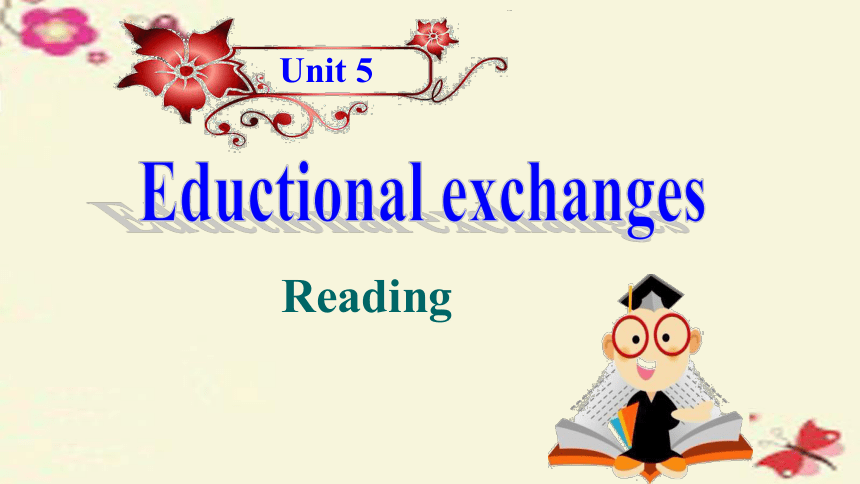 | |
| 格式 | zip | ||
| 文件大小 | 4.8MB | ||
| 资源类型 | 教案 | ||
| 版本资源 | 牛津深圳版 | ||
| 科目 | 英语 | ||
| 更新时间 | 2016-12-13 00:00:00 | ||
图片预览

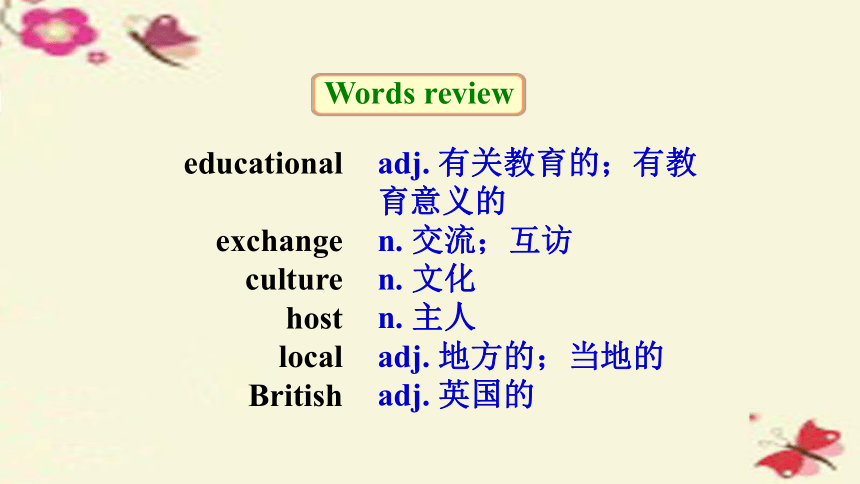
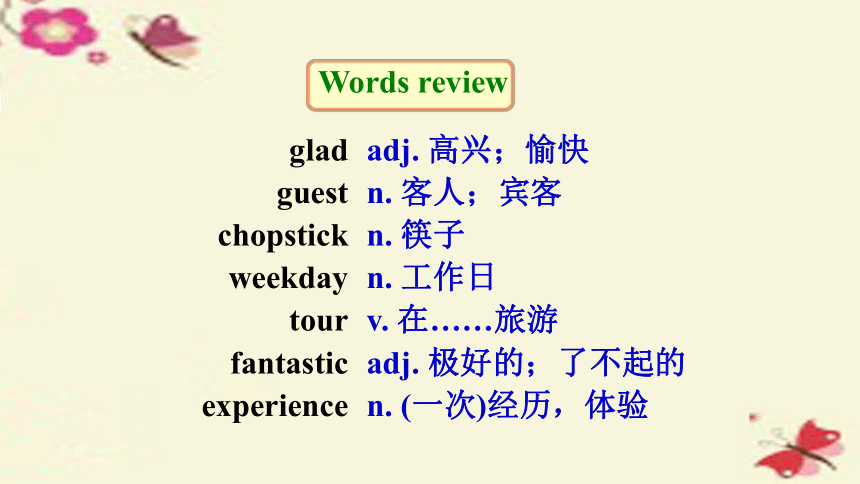

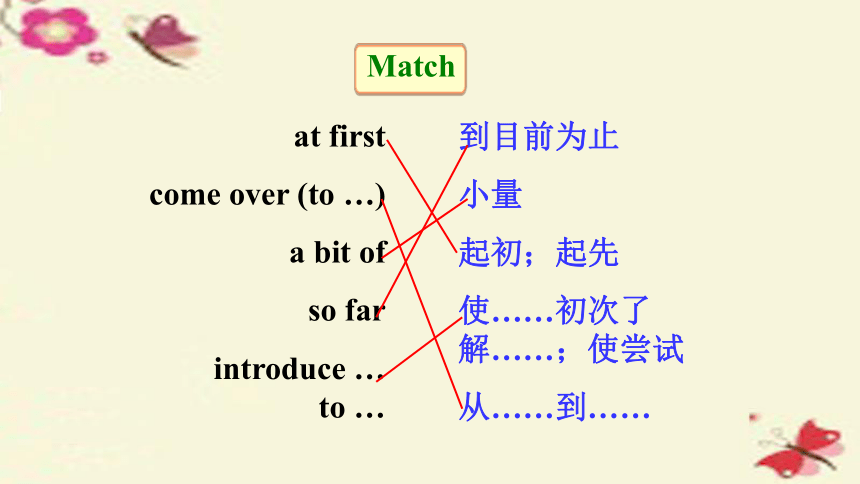
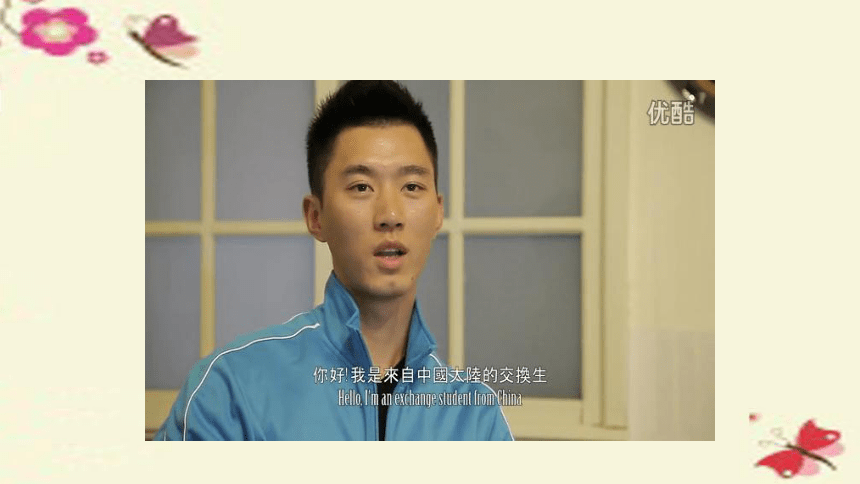
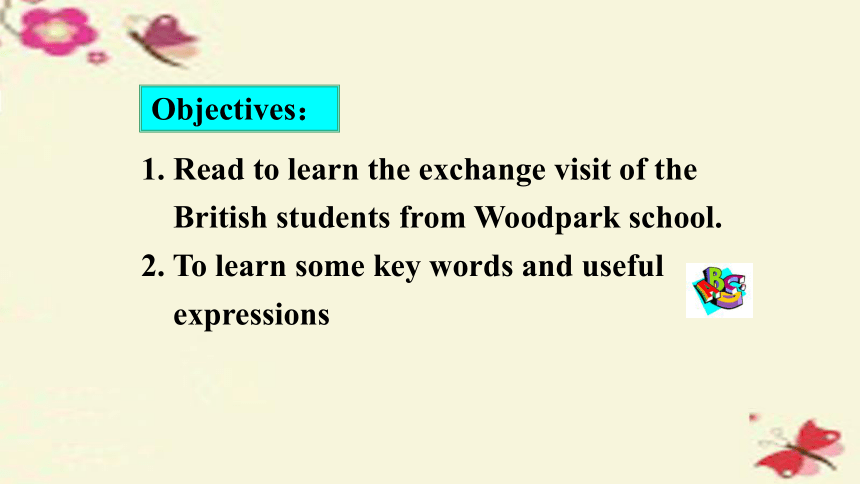


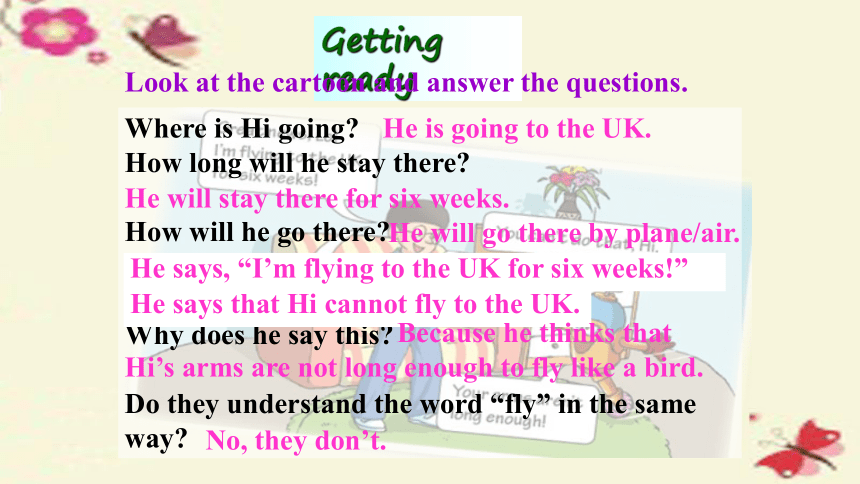
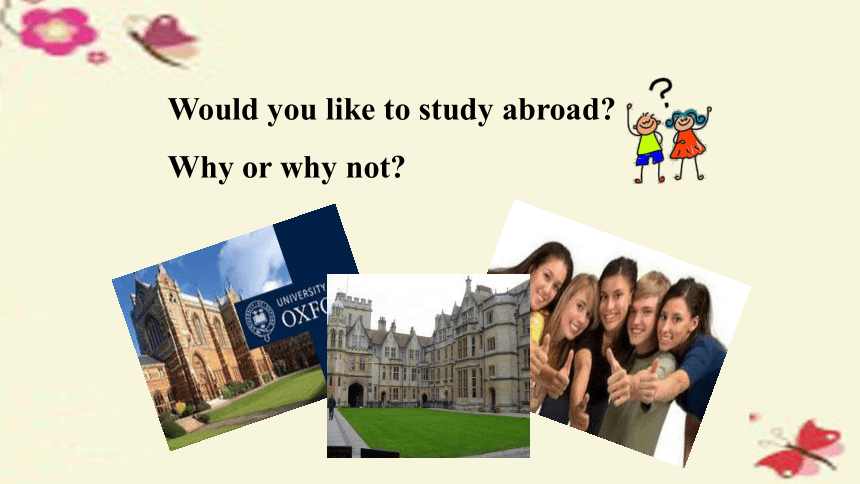
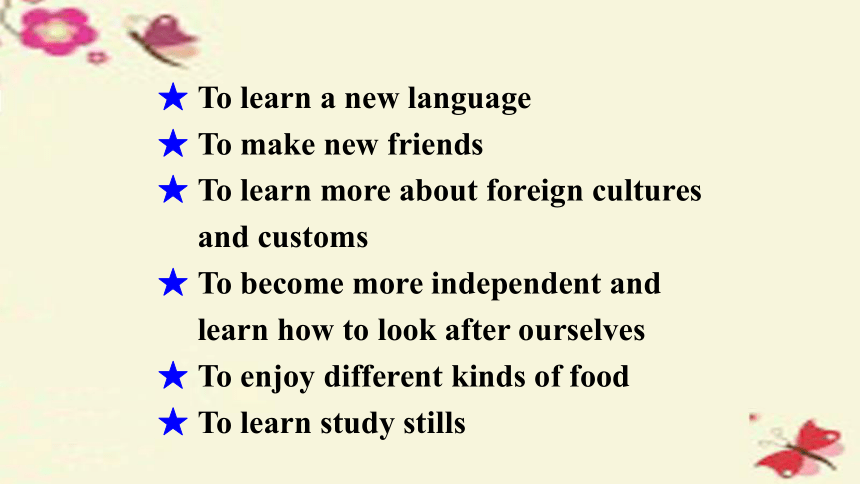
文档简介
课件57张PPT。ReadingUnit 5Eductional exchangeseducational
exchange
culture
host
local
Britishadj. 有关教育的;有教育意义的
n. 交流;互访
n. 文化
n. 主人
adj. 地方的;当地的
adj. 英国的glad
guest
chopstick
weekday
tour
fantastic
experienceadj. 高兴;愉快
n. 客人;宾客
n. 筷子
n. 工作日
v. 在……旅游
adj. 极好的;了不起的
n. (一次)经历,体验t’ai chi
already
introduce
success
yet
respectn. 太极(拳)
adv. 已经;早已
v. 使……初次了解……;
使尝试
n. 成功
adv. 尚未;仍未
v. 慎重对待;尊重at first
come over (to …)
a bit of
so far
introduce … to …到目前为止
小量
起初;起先
使……初次了解……;使尝试
从……到……1. Read to learn the exchange visit of the British students from Woodpark school.
2. To learn some key words and useful expressionsObjectives:Focus onKey words and useful expressions:glad spend tour fantastic introduce exchange success experiencehost family
at first
so far
a bit of ...
introduce…to…
come over (to)…寄宿家庭
起初;起先
到目前为止
一点,一些
使尝试
从……到……Have you ever been to a foreign country?Which country have you been to?Why did you go there?Which places did you visit?Getting readyLook at the cartoon and answer the questions.Where is Hi going?
How long will he stay there?
How will he go there?
How do you know that he will go there by plane?
What does Lo say?
Why does he say this?
Do they understand the word “fly” in the same way?He is going to the UK.He will stay there for six weeks.He will go there by plane/air.He says, “I’m flying to the UK for six weeks!”He says that Hi cannot fly to the UK. Because he thinks that Hi’s arms are not long enough to fly like a bird.No, they don’t.Would you like to study abroad?
Why or why not?★ To learn a new language
★ To make new friends
★ To learn more about foreign cultures
and customs
★ To become more independent and
learn how to look after ourselves
★ To enjoy different kinds of food
★ To learn study stillsThink and learnWhat is an educational exchange?An educational exchange is a
school programme.
Students from two different cities or
countries go to each other’s schools
and stay with host families for a short time.What do people probably do on an educational exchange?learn about
local customstalk to the
host familybuy gifts
for friendstry local foodmake
new friendsstudy at a local schoolvisit places of intereststay with
a local familyBrainsrormEric is talking about his exchange visit to China. Complete the sentence with the words from the box. Chinese culture host family
local school new friendsA What do you know about...?Pre-reading1I stayed with a
__________I made some ___________.I learnt a lot about
_____________.I visited a
___________.new friendshost family.local schoolChinese culture2341. Which country are the students from?
2. Where do they study during their
exchange visit?
3. What will they probably do during their
exchange visit?
4. What do they think of the exchange visit?At Xinhua Junior High School.The UK/Britain. They will probably learn about t’ai chi and Chinese painting.They think it is educational and
interesting. Look at the pictures, the title and the introduction to the article on page 67. Then answer the questions below. (P 66)B略读课文,找出下列形容词所对应的主语,完成表格。the exchange visitSarahSarah’s host familySarahEric’s experience A group of students from France come to Beijing on an educational exchange.
2. Sarah has learnt a lot of Chinese while she is staying with her host family.
3. Sarah isn’t nervous any longer because
her host family are friendly.
4. Sarah hopes to keep in touch with her
new friends after she goes back home.
5. Some students from Xinhua Junior
High School in Beijing will visit
London in two months.Listen to the article and decide whether the statements are true (T) or false (F). Britain/Londona littlenext month.Read and answer the questions.1. How did Sarah feel when she first arrived?
2. What does she think of her host family?
3. What has Sarah learnt from her host family?
4. What do the exchange students do on weekdays?
5. What do they do at the weekend?
6. What does Eric think of the educational
exchange?
7. What will Sarah do when she returns home?
8. What will some of the students from Xinhua
Junior High School do soon?Answers:1. How did Sarah feel when she first arrived?
2. What does she think of her host family?
3. What has Sarah learnt from her host family?
4. What do the exchange students do on weekdays?She was very nervous at first.She thinks her host family are really friendly. She’s learnt to use chopsticks and has leanrt a little Chinese.They spend the weekdays studying with Chinese students.5. What do they do at the weekend?
6. What does Eric think of the educational
exchange?
7. What will Sarah do when she returns home?
8. What will some of the students from Xinhua Junior High School do soon?She thinks it’s been a fantastic experience.She will keep in touch with her Chinese friends when she returns home.They will come over to the UK for the second part of the exchange soon.They tour around Beijing and visit places of interest with their host families.1. I am happy to meet you. I am _____ we
met. (line 7)
2. A person who is invited to stay at another
person’s home is a _____. (line 7)
3. Helen goes to school from Monday to
Friday. She has classes on _________.
(line 11)
4. The cake was really excellent. It tasted
________. (line 16)
5. Bob has got good exam results. His
parents are proud of his _______. (line25) successfantasticweekdaysgladguest The words in italics explain the meanings of some words on page 67. Find these words to complete the sentences.C1VocabularyFriday,8 July
Tomorrow I’m going to take part in an exchange programme in London. I’ll be there for two weeks. Over the two weeks, I hope to learn about British ______ and practise my English. I’ll be an ________ student at a famous school in London. Complete the diary below with the words from the box.already exchange introduce culture experience tour cultureexchangeC2I’m ______ a little nervous because I don’t know anymore there. However, the British students are the same age as me, so I think we’ll become good friends. They’ll ________ me to many new things. I also plan to ____ around London. The next two weeks should be a good __________ for me. alreadyintroducetour experienceReporter: Good morning. I’m a reporter
from a student newspaper. Can
I ask you a few questions?
Sarah: Sure.
Reporter: Why are you in Beijing?
Sarah: ___________________________
_________.
Reporter: Which school do you come from?
Sarah: _____________________________
_______. I am in Beijing on an educational
exchangeI come from Woodpark School in LondonComprehension A reporter from a student newspaper interviewed Sarah on campus. Read the article on page 67 and complete Sarah’s answers. D1Reporter: What do and your classmates do
in Beijing?
Sarah: We spend the weekdays _______
___________________. At the
weekend, ____________________
_____________________________
___________.
Reporter: That’s great. I hope you enjoy
the rest of your stay in Beijing.
Thank you and goodbye.
Sarah: You’re welcome. Bye. with Chinese studentsstudyingwe tour around Beijingand visit places of interest with our
host familiesRole-play1. Role play the conversation in groups;
2. Role play the conversation in front of the classLet’s see which group does the best. Miss Wilson came to Beijing with the
exchange students. Read the article again and complete her report below.The educational exchange visit to Beijing
went well last month. The host families
were very friendly. They taught our students how to use __________. They also taught our students to speak _______. chopsticksChineseD2Our students enjoyed their studies at the
school. They learnt a lot about Chinese
culture and history. They learnt some t’ai
chi. They also learnt _______________.
The students made ________________ in Beijing. They plan to keep in touch with
them. The Chinese students will come to
our school for _____________________
_________ next month. We need to get
ready soon. Chinese paintingmany new friendsthe second part of theexchangeFill in the blanks to retell the text. I was very ________ at first. However, my ____ family are really friendly. I’m ____ to be a guest in their home.
At the weekend, we ____ around Beijing and visit places of _______ with our host families. It’s been a fantastic _________
so far.nervousglad tourinteresthostexperience We’ve learnt a lot about Chinese culture
and history in school. The teachers have
__________ us to Chinese painting as well. I’ve made many new friends. I plan to keep in _____ with them when I return home. We’ll see one another soon because they’ll _____ ____ ___ the UK for the second part of the exchange next month.introducedtouchcome over toLanguage points 我读这部小说花了两个小时
I spent two hours reading the story.
我去泰国旅游花了7000元。
I spent about 7,000 yuan travelling to Thailand.1. The students spend the weekdays
studying with Chinese students.spend 意为“花时间;度过”
spend some time (in) doing sth.
花时间做某事
spend 还可表示“花钱”2. At the weekend, they tour around Beijing and visit places of interest with their host families.
tour v. 在……旅游
Do you want to tour with me?
你想和我一起去旅游吗?
We spend four weeks touring around Europe.
我们花了四个星期周游欧洲。places of interest 名胜古迹
There are many places of interest in
Mount Tai. 泰山上有很多名胜古迹。
We want to see all the places of interest
around here.
我们想参观这儿所有的名胜。
host family 寄宿家庭
My host family are nice to me.
我的寄宿家庭对我很好。3. It’s been a fantastic experience so far.I have a fantastic school life.
我的学校生活丰富多彩。
I thought he was fantastic.
我认为他太棒了。It’s 是 It has 的缩写形式。 fantastic adj. 极好的,了不起的 experience
1)意为(一次) 经历、体验时,是可数名词。
an experience of traveling abroad
It was a great experience.
这是一次绝妙的体验。
2) 强调经历的整体性或意为“经验”是不可数名词。
The greatest teacher is experience.
经验是最好的老师。 so far 迄今为止
What do you know so far?
到现在为止你们都知道了什么?
They don’t know the results of test so far.
他们到现在还不知道测试结果。4. I’ve learnt a bit of t’ai chi, and I really enjoy it.a bit of 意为“少量;一点儿”,用来修饰不可数名词,相当于a little。
a bit 意为“稍微;有点儿”,用来修饰形容词或副词。办公室里出了点儿麻烦。
There’s been a bit of trouble at the office.
我有点儿累。我想我现在必须得回家。
I’m a bit tired. I think I have to go home now. 5. The teachers have introduced us to
Chinese painting as well.
introduce v. 使……初次了解
introduce…to…使……初次了解……
Apple will introduce its next iphone soon.
苹果公司不久将要推出下一代 iphone.
Mary will introduce me to some
important people.
玛丽将要给我介绍一些重要人物。6. I haven’t had much success yet, but I’ll keep trying.success 作“成功”讲时,是不可数名词;作“成功的人或事”讲时,是可数名词。他在人生道路上已取得了很大成功。
He has had great success in life.
她的新书获得了巨大的成功。
Her new book was a big success. keep doing (sth.) 一直 / 反复做 (某事)门卫一直站在大门口。
The guard keeps standing at the gate. 用括号中所给单词的适当形式填空。
1. He kept _______ (call) me, but I didn’t
want to talk to him.
2. What’s the secret of your ________ (success)?callingsuccess7. We’ll see one another soon because they’ll come over to the UK for the second part of the exchange next month.
1) one another 是不定代词,意为“互相”
We have learnt a lot about one another.
2) come over to 从……到……
Would you like to come over to our
home for mid-autumn festival?
你愿意来我们家过中秋节吗?
I’ll come over to your hotel.
我将要去你住的宾馆。3) for the second part of 意为
“作为… 的另一部分”
We’ll learn some local culture for the second of this lesson.
我们将要了解一些当地文化,作为这堂课的另一部分。Let the word fly1. at that moment 在那时
At that moment, a boy entered the classroom.
就在那时,一个男生走进教室。
2. at first 开始
I was a bit lonely at first, but people here are friendly, so I am never alone any more.
开始我有点孤独,但是这儿的人们很友好, 所以我再没孤单过。3. at the end of 在……结束时
And then one of us plays a solo of some Irish dance music at the end of the Starsearch concert.
然后我们中的一位要再明星大搜寻结束时独奏一段爱尔兰舞曲。
4. at least 至少
At least you’ll prove how honest you are.
至少你证明了自己是诚实的。
5. at work 上班
He spends more time at work than at play.
他在工作上花的时间比玩上多。Game timeNow I will divide you into several groups.
Make up sentences with your partners
with “at…”. Then speak them out to us. Let’s see which group is the
most productive. Reflectionspend some time (in) doing sth.
tour v. 在……旅游
places of interest host family
It’s been a fantastic experience so far.
a bit of / a bit
introduce…to…
I haven’t had much success yet, but I’ll keep trying.
We’ll see one another soon because they’ll come over to the UK for the second part of the exchange next month.Now 2 mins to test your spelling.Spelling Bee1. English-Chinese
host, guest, chopstick, weekday, experience, t’ai chi, yet
2. Chinese-English
有关教育的;交流;文化;当地的;英国的;高兴;在……旅游;极好的/了不起的;已经;使尝试;成功;尊重When finished, exchange your papers to see who does the best.翻译下列短语。
寄宿家庭 ____________
起初;起先____________
到目前为止_________
小量 _________
使……初次了解… _______________
从……到……_______________
名胜古迹 _________________
保持联系 ___________________
教育交流____________________host familyat firstso farintroduce… to…come over to…places of interestkeep in touch with sb.a bitexchange visit基础巩固题 Module 3, Unit 5Words and phrases根据要求写出相应的单词。1. education (形容词) _____________
2. successful (名词) ___________
3. chopstick (复数) ___________
4. introduction (动词) ___________
5. Britain (形容词) ___________
6. travel (同义词) ____________ educational success chopsticks introduce tour British II. 汉译英。
1. 寄宿家庭 ________________
2. 以……而自豪 ________________
3. 起初 _____________
4. 到目前为止 ________________
5. 小量 _____________
6. 使……初次了解…… _______________
7. 申请 __________________
8. 对……友好 _______________
9. 参加 ________________
10.(通常远距离地)从……到……
____________________ host familybe proud of at first so far a bit of introduce … to …apply for be friendly to take part income over (to …)II. 根据要求写出相应的单词。
1. education (形容词) ___________
2. cultural (名词) ________
3. Britain (形容词) ________
4. introduce (过去分词) _________
5. already (反义词) ______
6. successful (名词) _________
7. weekday (复数) _________educationalcultureBritish yetsuccessweekdaysintroducedIII. 根据所给的中文完成句子,每空一词。
1. 起初,你有点儿紧张吗?
Were you __ _______ nervous ___ ____?
2. 你已经学会用筷子了吗?
Have you ______ ___ ___ _________ yet?
3. 体育老师已经使我们初次了解了太极拳。
The PE teacher has __________ ___ ___
t’ai chi.
4. 如果你一直努力,你会获得成功的。
If you ____ ______, you’ll ____ _______.
5. 我迫不及待地想见到他。
I _____ ____ ___ see him.a little/bitat firstlearnt to use chopstickskeep tryingintroduced us tocan’t wait tohave successHomeworkLearn the new words and phrases by heart after class.
2. Read the articles in page 1 of Learning English. The more you read, the faster and better you’ll understand.
3. Preview Listening on page 70.
exchange
culture
host
local
Britishadj. 有关教育的;有教育意义的
n. 交流;互访
n. 文化
n. 主人
adj. 地方的;当地的
adj. 英国的glad
guest
chopstick
weekday
tour
fantastic
experienceadj. 高兴;愉快
n. 客人;宾客
n. 筷子
n. 工作日
v. 在……旅游
adj. 极好的;了不起的
n. (一次)经历,体验t’ai chi
already
introduce
success
yet
respectn. 太极(拳)
adv. 已经;早已
v. 使……初次了解……;
使尝试
n. 成功
adv. 尚未;仍未
v. 慎重对待;尊重at first
come over (to …)
a bit of
so far
introduce … to …到目前为止
小量
起初;起先
使……初次了解……;使尝试
从……到……1. Read to learn the exchange visit of the British students from Woodpark school.
2. To learn some key words and useful expressionsObjectives:Focus onKey words and useful expressions:glad spend tour fantastic introduce exchange success experiencehost family
at first
so far
a bit of ...
introduce…to…
come over (to)…寄宿家庭
起初;起先
到目前为止
一点,一些
使尝试
从……到……Have you ever been to a foreign country?Which country have you been to?Why did you go there?Which places did you visit?Getting readyLook at the cartoon and answer the questions.Where is Hi going?
How long will he stay there?
How will he go there?
How do you know that he will go there by plane?
What does Lo say?
Why does he say this?
Do they understand the word “fly” in the same way?He is going to the UK.He will stay there for six weeks.He will go there by plane/air.He says, “I’m flying to the UK for six weeks!”He says that Hi cannot fly to the UK. Because he thinks that Hi’s arms are not long enough to fly like a bird.No, they don’t.Would you like to study abroad?
Why or why not?★ To learn a new language
★ To make new friends
★ To learn more about foreign cultures
and customs
★ To become more independent and
learn how to look after ourselves
★ To enjoy different kinds of food
★ To learn study stillsThink and learnWhat is an educational exchange?An educational exchange is a
school programme.
Students from two different cities or
countries go to each other’s schools
and stay with host families for a short time.What do people probably do on an educational exchange?learn about
local customstalk to the
host familybuy gifts
for friendstry local foodmake
new friendsstudy at a local schoolvisit places of intereststay with
a local familyBrainsrormEric is talking about his exchange visit to China. Complete the sentence with the words from the box. Chinese culture host family
local school new friendsA What do you know about...?Pre-reading1I stayed with a
__________I made some ___________.I learnt a lot about
_____________.I visited a
___________.new friendshost family.local schoolChinese culture2341. Which country are the students from?
2. Where do they study during their
exchange visit?
3. What will they probably do during their
exchange visit?
4. What do they think of the exchange visit?At Xinhua Junior High School.The UK/Britain. They will probably learn about t’ai chi and Chinese painting.They think it is educational and
interesting. Look at the pictures, the title and the introduction to the article on page 67. Then answer the questions below. (P 66)B略读课文,找出下列形容词所对应的主语,完成表格。the exchange visitSarahSarah’s host familySarahEric’s experience A group of students from France come to Beijing on an educational exchange.
2. Sarah has learnt a lot of Chinese while she is staying with her host family.
3. Sarah isn’t nervous any longer because
her host family are friendly.
4. Sarah hopes to keep in touch with her
new friends after she goes back home.
5. Some students from Xinhua Junior
High School in Beijing will visit
London in two months.Listen to the article and decide whether the statements are true (T) or false (F). Britain/Londona littlenext month.Read and answer the questions.1. How did Sarah feel when she first arrived?
2. What does she think of her host family?
3. What has Sarah learnt from her host family?
4. What do the exchange students do on weekdays?
5. What do they do at the weekend?
6. What does Eric think of the educational
exchange?
7. What will Sarah do when she returns home?
8. What will some of the students from Xinhua
Junior High School do soon?Answers:1. How did Sarah feel when she first arrived?
2. What does she think of her host family?
3. What has Sarah learnt from her host family?
4. What do the exchange students do on weekdays?She was very nervous at first.She thinks her host family are really friendly. She’s learnt to use chopsticks and has leanrt a little Chinese.They spend the weekdays studying with Chinese students.5. What do they do at the weekend?
6. What does Eric think of the educational
exchange?
7. What will Sarah do when she returns home?
8. What will some of the students from Xinhua Junior High School do soon?She thinks it’s been a fantastic experience.She will keep in touch with her Chinese friends when she returns home.They will come over to the UK for the second part of the exchange soon.They tour around Beijing and visit places of interest with their host families.1. I am happy to meet you. I am _____ we
met. (line 7)
2. A person who is invited to stay at another
person’s home is a _____. (line 7)
3. Helen goes to school from Monday to
Friday. She has classes on _________.
(line 11)
4. The cake was really excellent. It tasted
________. (line 16)
5. Bob has got good exam results. His
parents are proud of his _______. (line25) successfantasticweekdaysgladguest The words in italics explain the meanings of some words on page 67. Find these words to complete the sentences.C1VocabularyFriday,8 July
Tomorrow I’m going to take part in an exchange programme in London. I’ll be there for two weeks. Over the two weeks, I hope to learn about British ______ and practise my English. I’ll be an ________ student at a famous school in London. Complete the diary below with the words from the box.already exchange introduce culture experience tour cultureexchangeC2I’m ______ a little nervous because I don’t know anymore there. However, the British students are the same age as me, so I think we’ll become good friends. They’ll ________ me to many new things. I also plan to ____ around London. The next two weeks should be a good __________ for me. alreadyintroducetour experienceReporter: Good morning. I’m a reporter
from a student newspaper. Can
I ask you a few questions?
Sarah: Sure.
Reporter: Why are you in Beijing?
Sarah: ___________________________
_________.
Reporter: Which school do you come from?
Sarah: _____________________________
_______. I am in Beijing on an educational
exchangeI come from Woodpark School in LondonComprehension A reporter from a student newspaper interviewed Sarah on campus. Read the article on page 67 and complete Sarah’s answers. D1Reporter: What do and your classmates do
in Beijing?
Sarah: We spend the weekdays _______
___________________. At the
weekend, ____________________
_____________________________
___________.
Reporter: That’s great. I hope you enjoy
the rest of your stay in Beijing.
Thank you and goodbye.
Sarah: You’re welcome. Bye. with Chinese studentsstudyingwe tour around Beijingand visit places of interest with our
host familiesRole-play1. Role play the conversation in groups;
2. Role play the conversation in front of the classLet’s see which group does the best. Miss Wilson came to Beijing with the
exchange students. Read the article again and complete her report below.The educational exchange visit to Beijing
went well last month. The host families
were very friendly. They taught our students how to use __________. They also taught our students to speak _______. chopsticksChineseD2Our students enjoyed their studies at the
school. They learnt a lot about Chinese
culture and history. They learnt some t’ai
chi. They also learnt _______________.
The students made ________________ in Beijing. They plan to keep in touch with
them. The Chinese students will come to
our school for _____________________
_________ next month. We need to get
ready soon. Chinese paintingmany new friendsthe second part of theexchangeFill in the blanks to retell the text. I was very ________ at first. However, my ____ family are really friendly. I’m ____ to be a guest in their home.
At the weekend, we ____ around Beijing and visit places of _______ with our host families. It’s been a fantastic _________
so far.nervousglad tourinteresthostexperience We’ve learnt a lot about Chinese culture
and history in school. The teachers have
__________ us to Chinese painting as well. I’ve made many new friends. I plan to keep in _____ with them when I return home. We’ll see one another soon because they’ll _____ ____ ___ the UK for the second part of the exchange next month.introducedtouchcome over toLanguage points 我读这部小说花了两个小时
I spent two hours reading the story.
我去泰国旅游花了7000元。
I spent about 7,000 yuan travelling to Thailand.1. The students spend the weekdays
studying with Chinese students.spend 意为“花时间;度过”
spend some time (in) doing sth.
花时间做某事
spend 还可表示“花钱”2. At the weekend, they tour around Beijing and visit places of interest with their host families.
tour v. 在……旅游
Do you want to tour with me?
你想和我一起去旅游吗?
We spend four weeks touring around Europe.
我们花了四个星期周游欧洲。places of interest 名胜古迹
There are many places of interest in
Mount Tai. 泰山上有很多名胜古迹。
We want to see all the places of interest
around here.
我们想参观这儿所有的名胜。
host family 寄宿家庭
My host family are nice to me.
我的寄宿家庭对我很好。3. It’s been a fantastic experience so far.I have a fantastic school life.
我的学校生活丰富多彩。
I thought he was fantastic.
我认为他太棒了。It’s 是 It has 的缩写形式。 fantastic adj. 极好的,了不起的 experience
1)意为(一次) 经历、体验时,是可数名词。
an experience of traveling abroad
It was a great experience.
这是一次绝妙的体验。
2) 强调经历的整体性或意为“经验”是不可数名词。
The greatest teacher is experience.
经验是最好的老师。 so far 迄今为止
What do you know so far?
到现在为止你们都知道了什么?
They don’t know the results of test so far.
他们到现在还不知道测试结果。4. I’ve learnt a bit of t’ai chi, and I really enjoy it.a bit of 意为“少量;一点儿”,用来修饰不可数名词,相当于a little。
a bit 意为“稍微;有点儿”,用来修饰形容词或副词。办公室里出了点儿麻烦。
There’s been a bit of trouble at the office.
我有点儿累。我想我现在必须得回家。
I’m a bit tired. I think I have to go home now. 5. The teachers have introduced us to
Chinese painting as well.
introduce v. 使……初次了解
introduce…to…使……初次了解……
Apple will introduce its next iphone soon.
苹果公司不久将要推出下一代 iphone.
Mary will introduce me to some
important people.
玛丽将要给我介绍一些重要人物。6. I haven’t had much success yet, but I’ll keep trying.success 作“成功”讲时,是不可数名词;作“成功的人或事”讲时,是可数名词。他在人生道路上已取得了很大成功。
He has had great success in life.
她的新书获得了巨大的成功。
Her new book was a big success. keep doing (sth.) 一直 / 反复做 (某事)门卫一直站在大门口。
The guard keeps standing at the gate. 用括号中所给单词的适当形式填空。
1. He kept _______ (call) me, but I didn’t
want to talk to him.
2. What’s the secret of your ________ (success)?callingsuccess7. We’ll see one another soon because they’ll come over to the UK for the second part of the exchange next month.
1) one another 是不定代词,意为“互相”
We have learnt a lot about one another.
2) come over to 从……到……
Would you like to come over to our
home for mid-autumn festival?
你愿意来我们家过中秋节吗?
I’ll come over to your hotel.
我将要去你住的宾馆。3) for the second part of 意为
“作为… 的另一部分”
We’ll learn some local culture for the second of this lesson.
我们将要了解一些当地文化,作为这堂课的另一部分。Let the word fly1. at that moment 在那时
At that moment, a boy entered the classroom.
就在那时,一个男生走进教室。
2. at first 开始
I was a bit lonely at first, but people here are friendly, so I am never alone any more.
开始我有点孤独,但是这儿的人们很友好, 所以我再没孤单过。3. at the end of 在……结束时
And then one of us plays a solo of some Irish dance music at the end of the Starsearch concert.
然后我们中的一位要再明星大搜寻结束时独奏一段爱尔兰舞曲。
4. at least 至少
At least you’ll prove how honest you are.
至少你证明了自己是诚实的。
5. at work 上班
He spends more time at work than at play.
他在工作上花的时间比玩上多。Game timeNow I will divide you into several groups.
Make up sentences with your partners
with “at…”. Then speak them out to us. Let’s see which group is the
most productive. Reflectionspend some time (in) doing sth.
tour v. 在……旅游
places of interest host family
It’s been a fantastic experience so far.
a bit of / a bit
introduce…to…
I haven’t had much success yet, but I’ll keep trying.
We’ll see one another soon because they’ll come over to the UK for the second part of the exchange next month.Now 2 mins to test your spelling.Spelling Bee1. English-Chinese
host, guest, chopstick, weekday, experience, t’ai chi, yet
2. Chinese-English
有关教育的;交流;文化;当地的;英国的;高兴;在……旅游;极好的/了不起的;已经;使尝试;成功;尊重When finished, exchange your papers to see who does the best.翻译下列短语。
寄宿家庭 ____________
起初;起先____________
到目前为止_________
小量 _________
使……初次了解… _______________
从……到……_______________
名胜古迹 _________________
保持联系 ___________________
教育交流____________________host familyat firstso farintroduce… to…come over to…places of interestkeep in touch with sb.a bitexchange visit基础巩固题 Module 3, Unit 5Words and phrases根据要求写出相应的单词。1. education (形容词) _____________
2. successful (名词) ___________
3. chopstick (复数) ___________
4. introduction (动词) ___________
5. Britain (形容词) ___________
6. travel (同义词) ____________ educational success chopsticks introduce tour British II. 汉译英。
1. 寄宿家庭 ________________
2. 以……而自豪 ________________
3. 起初 _____________
4. 到目前为止 ________________
5. 小量 _____________
6. 使……初次了解…… _______________
7. 申请 __________________
8. 对……友好 _______________
9. 参加 ________________
10.(通常远距离地)从……到……
____________________ host familybe proud of at first so far a bit of introduce … to …apply for be friendly to take part income over (to …)II. 根据要求写出相应的单词。
1. education (形容词) ___________
2. cultural (名词) ________
3. Britain (形容词) ________
4. introduce (过去分词) _________
5. already (反义词) ______
6. successful (名词) _________
7. weekday (复数) _________educationalcultureBritish yetsuccessweekdaysintroducedIII. 根据所给的中文完成句子,每空一词。
1. 起初,你有点儿紧张吗?
Were you __ _______ nervous ___ ____?
2. 你已经学会用筷子了吗?
Have you ______ ___ ___ _________ yet?
3. 体育老师已经使我们初次了解了太极拳。
The PE teacher has __________ ___ ___
t’ai chi.
4. 如果你一直努力,你会获得成功的。
If you ____ ______, you’ll ____ _______.
5. 我迫不及待地想见到他。
I _____ ____ ___ see him.a little/bitat firstlearnt to use chopstickskeep tryingintroduced us tocan’t wait tohave successHomeworkLearn the new words and phrases by heart after class.
2. Read the articles in page 1 of Learning English. The more you read, the faster and better you’ll understand.
3. Preview Listening on page 70.
